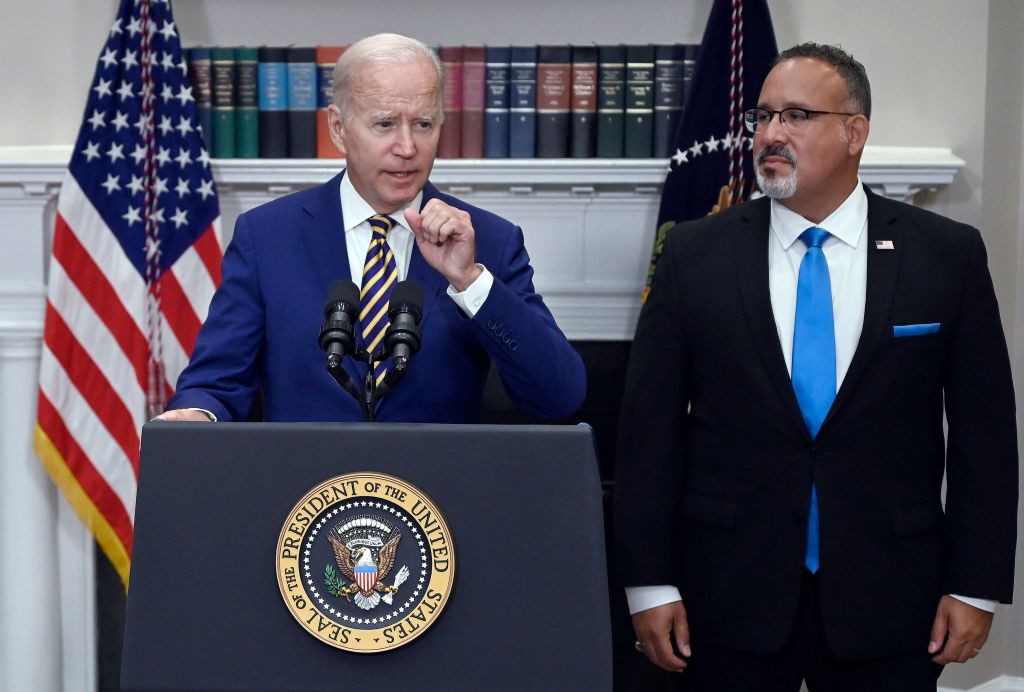The Biden administration wants to avoid judicial review of its student loan erasure program—badly. First it tweaked the program to sidestep a lawsuit on behalf of a man who would have faced tax consequences in Indiana. Then it changed the program’s eligibility to quash a lawsuit from six states. The latest lawsuit, challenging the Education Department’s evident failure to consider public comments before issuing new regulations, could be more difficult for officials to sidestep. But you can be sure the White House will try.
Why is Team Biden working so hard to avoid judicial review? They know their student-loan program faces real peril in court. The nominal justification—pandemic relief—is obviously a pretext. And as the Supreme Court made clear during the Trump administration, that is a fatal flaw.
When President Biden announced his policy to not collect hundreds of billions of dollars in student loan payments, the Justice Department issued a legal memo trying to justify it. This document was characteristically careful, laden with caveats, as it had to be.
The law supposedly supporting this program, the HEROES Act of 2003, was enacted by Congress to support servicemembers and their families after the 9/11 attacks. “There is no more important cause for this Congress,” the text emphasizes, “than to support the members of the United States military and provide assistance with their transition into and out of active duty and active service.” To that end, the legislation gives the education secretary significant—but limited—discretion to “waive or modify” student loans, when “necessary,” in “connection with a war or other military operation or national emergency.”
That “national emergency” is the pandemic, according to the Justice Department’s memo. The DOJ’s Office of Legal Counsel emphasized that to implement this program the education secretary will “need to determine that the COVID-19 pandemic was a but-for cause of the financial harm” justifying the loan’s modification. Even the Education Department’s more cursory memo conceded that loan forgiveness needed to be directed to “financial harms caused by the COVID-19 pandemic,” and that actual forgiveness decisions needed to be supported “by evidence regarding the financial harms that borrowers have experienced, or will likely experience.”
These memos they bear no resemblance to President Biden’s actual justifications for the policy. “I made a commitment that we’d provide student debt relief,” he said at a White House event. “And I’m honoring that commitment today.” His explanation was simple: “If you make under $125,000, you’ll get $10,000 knocked off your student debt.” And if you received a Pell grant, “you’ll get an additional $10,000 knocked off.”
That doesn’t sound like relief for specific people who were demonstrably harmed by the pandemic. “Ninety-five percent of borrowers” would benefit, Biden announced. “That’s 43 million people.” He spent no time explaining how he would keep this sweeping loan-cancellation program in the bounds laid out by his administration’s lawyers.
The White House’s “Fact Sheet” and the Education Department’s website took similar approaches, making cursory reference to COVID-19 but offering no indication borrowers actually need to show financial harm tied to the pandemic. The Education Department simply states that to be eligible, “your annual income must have fallen below $125,000 (for individuals) or $250,000 (for married couples or heads of households).” Similarly, the Department’s draft application for student loan relief asks only about the borrower’s loans and income, not requiring any proof of financial harm from the pandemic.
So much for requiring actual “evidence” that forgiving a loan would remedy one’s financial harms from the pandemic. When the department eventually posts the application form, will it screen borrowers to require proof of actual financial harms from the pandemic?
Anyone can see what’s really happening, and Biden’s allies admit as much. “With the flick of a pen,” Sens. Elizabeth Warren and Chuck Schumer crowed, “President Biden has taken a giant step forward in addressing the student debt crisis by canceling significant amounts of student debt for millions of borrowers.”
Yet the administration’s pretext is much more consequential in courts of law. The Education Department, thanks to the Administrative Procedure Act, must give a reasoned explanation for its decision to forgive the loans. Whether the agency issues a rule categorically canceling the debts, or proceeds on a case-by-case basis, it needs to explain why the policy satisfies the HEROES Act’s requirements.
This isn’t a partisan issue: The Supreme Court already has emphasized an obviously pretextual justification is no justification at all.
In 2018 the Trump administration sought to add a citizenship question to the census, citing administering the Voting Rights Act as a justification. Three years ago, in Commerce v. New York, the Supreme Court struck the move down in a 5-4 decision. The administration’s explanation “is incongruent with what the record reveals about the agency’s priorities and administrative process,” Chief Justice John Roberts wrote with the court’s then-four liberal justices. “We cannot ignore the disconnect between the decision made and the explanation given.” While “our review is deferential,” they added, the courts are “not required to exhibit a naiveté from which ordinary citizens are free.”
Imposing greater steadiness, and a clearer rule of law, on the administrative state’s erratic moves and mood swings has been a clear priority for Roberts for some time. He began these efforts during the Obama administration, and continued them throughout Trump’s time in office. If the Biden administration continues to defend the policy as it has—whether at Justice or Education—it’s unlikely to survive a court challenge. No wonder the administration is fighting tooth and nail to keep this out of court altogether.
It may well succeed—sometimes lawbreakers outrun the law—but the president is duty-bound to faithfully execute the law. Weeks before the presidential election, he pledged, “I promise you that if I’m elected, I’ll always tell you the truth.”
Honesty is indeed the best policy. And, like Trump, Biden may learn that the hard way.








Please note that we at The Dispatch hold ourselves, our work, and our commenters to a higher standard than other places on the internet. We welcome comments that foster genuine debate or discussion—including comments critical of us or our work—but responses that include ad hominem attacks on fellow Dispatch members or are intended to stoke fear and anger may be moderated.